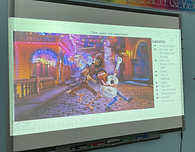MY TEACHING PHILOSOPHY

Interdisciplinary
My beliefs about what is worth knowing are basic skills such as reading, writing, and computation. Play, motor skills, reasoning, communication, and problem-solving complement these skills. Together, these construct the foundations to create meaningful connections across disciplines and life skills. These interdisciplinary connections go hand in hand to help children flourish and understand the complex interactions in the world around us.
Arts Integration & Art-based Learning:
I value the importance of art-based learning. Integrating the arts into the curricula is crucial to exercise creativity, imagination, critical thought, and expression of one's self. This should and can be exercised across all disciplines as the creative arts can help children express, reflect, and explore human experiences. Integrating and fostering the love of the arts can teach students about curiosity and meaning through experimentation.
Building Positive Relationships & Communities:
My belief about teaching and learning is that learning results from an individual's internal and external forces. The internal force is the student's work ethic and motivation. While the external force is the support from teachers, parents, and the community. As a teacher, it is essential to attain and maintain positive relationships with the student, the student's parents, and the school staff and community. Most importantly, this means building meaningful and authentic connections and trust with your students by acknowledging their interests, learning styles, and differentiation needs.

Relevance & Technology:
It is crucial to incorporate current and meaningful topics/examples that are relevant to the students' world around them. As well as including diverse content that represents our multicultural society. This also includes teaching with digital technology. Today, technology plays a significant role in students' daily lives and is advancing rapidly. It is crucial to stay relevant and use technology to enhance your lessons. Technology can enrich learning if it is done with meaning and purpose.



Differentiation & Diversity:
I deeply value differentiation in a classroom, as each class you teach will be unique in its own way. It is essential to meet the diverse needs of the classroom by planning lessons with all learning styles in mind, trying different classroom management strategies, and accommodating adapted and modified students. Not only academic diversity but cultural diversity and representation are essential. The content, examples, concepts, and stories should reflect our diverse classroom and community.

Love of Learning & Hands-on Approach:
The love of learning and growth is fueled by experiences fostered by the teachers, community and world around us. A hands-on approach provides opportunities for students to engage with real-life experiences, examples, and interactions. New and known knowledge should not only be contained locally but also help our young citizens influence and understand their world beyond the classroom and country.








